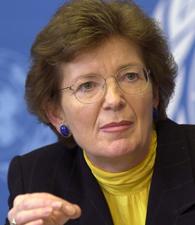Mass human migration underlines importance of Climate Justice - Mary Robinson

"Ireland has great potential and can become a great leader in Climate Justice," former President Mary Robinson said at a debate in Trinity College Dubiln today. The debate explored ways to build greater awareness amongst political leaders and the broader public about the inter-connectedness of climate change with issues of development and social justice. Chaired by Minister for Communications, Energy & Natural Resources Eamon Ryan, the debate is one of several in the Transforming Ireland series. By Christina Finn
"Climate Justice tackles the human impacts of climate change," Mary Robinson said. "I had hoped the UN Copenhagen climate change conference in 2009 would signal a change. Sadly no fair or binding deal emerged. Our politicians have failed us."
A former Human Rights Commissioner at the United Nations, she recently founded the Mary Robinson Foundation foundation for Climate Justice which will begin working in earnest in January. She outlined how climate change and human rights are inextricably linked. "Climate change is the greatest threat to human rights that we will ever see our lifetimes". She said climate change's effects such as rising tides, increased rainfalls and rising temperatures threatens people's health and livelihoods. "Climate change undermines the enjoyment of human rights".
Ms Robinson said that climate change was a security issue for many people. Climate change is a "grim reality for many in developing countries where people struggle to get the basic necessities due to the shifting seasons."
For too long climate change discussions have been stagnant and have stayed in the realm of science , Mary Robinson said. She said the myths surrounding climate change were that climate change is a possibility and not a fact, that it will affect our future and not our present and it affect plants and not humans.
"An image of a polar bear on a melting ice cap does not begin to convey the problem," said Ms Robinson, adding that young people must to take the cause further.
"We are not listening enough to research like Nicholas Sterns' economics of climate change and Project Catalyst. Politics needs to catch up with science."
She said that economies should develop in a sustainable way. "The rights, needs and voices of the most affected by climate change have to be heard and listened to."
Global partnerships are key to achieving Climate Justice she said. "We must all take actions in our own lives. Failure to act is unacceptable. Politicians will not change until they feel pressure from their own constituencies. Creative thinking is so important."
"It is a terrible indignation that 1.6 billion people in our world don't have electricity. When I was in Liberia talking to people, there were people with no electricity to light their homes but they had mobile phones." She said Climate Justices means that development and transfer of low-carbon, affordable, and appropriate technologies are scaled up to reach low-income households, as well as countries as a whole.
The former president said that China was fostering the model for new innovative thinking by creating many new jobs in the green energy industries.
The British environmentalist James Lovelock wrote in recent years that temperate islands such as Ireland will soon become "lifeboats for humanity". Mary Robinson echoed this sentiment and said that forced immigration will become a huge issue in the next decade due to climate change. "Providing shelter for these people can be done in an ethical way. In Pakistan at the moment there are thousands homeless and they will remain homeless for next decade, and also in Haiti, due to the earthquake and now the cholera outbreak. We need to find smart ways and smart shelters, as we are going to see a rise in forced environmental refugees".
The implantation of innovative ideas in developing countries was another important issue said Ms Robinson. She said while there were extraordinary things happening, it was for a 100,000 here and there.
"The real issue is scalability. We need public and private partnerships to harness the power of governments, the UN, the private sector and faith based groups in order to make things work. That would be the best change in poverty."
Ms Robison quoted the late British economist Barbara Ward, a woman she describes as the Al Gore of her day, "We have forgotten to be good guests, and walk lightly."
"I think we have forgotten to walk lightly on the earth in a way that is environmentally friendly," said Mary Robinson.
When questioned whether the government would uphold promises to meet their targets of overseas development aid TD Eamon Ryan said that the government would hold up their commitments to funding "even in these financially tough times."
